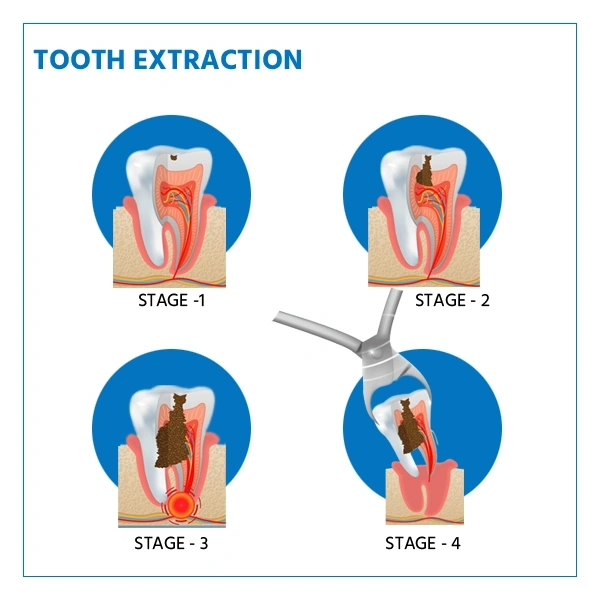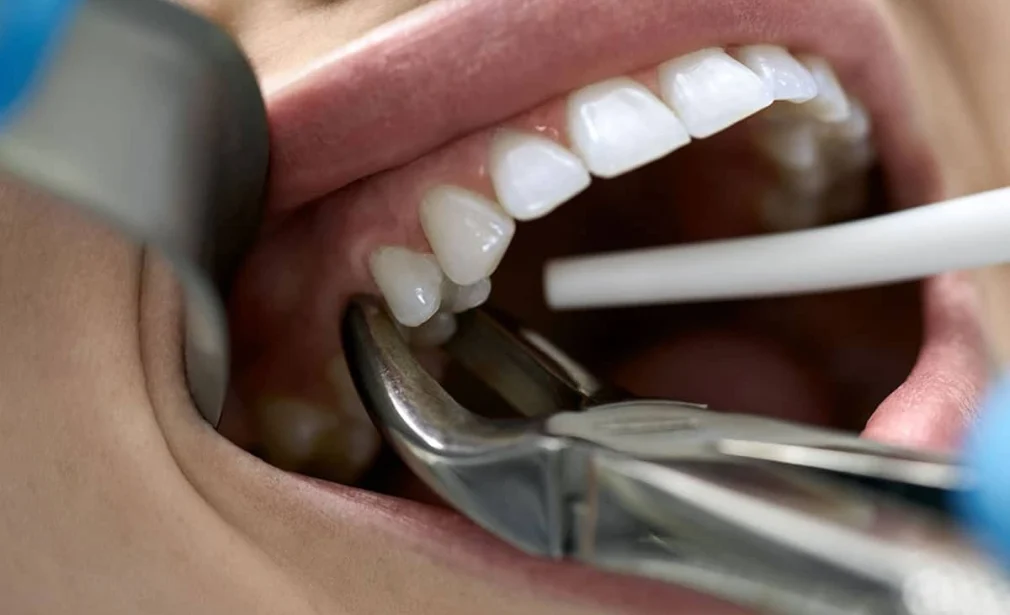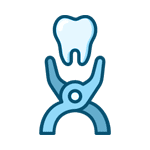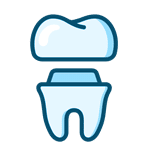Tooth extraction and wisdom tooth extraction in Dubai
We take pride in having the best dentist for tooth extraction and wisdom tooth extraction in Motor City, Dubai. The procedure is minimally invasive and pain free. With the help of the latest equipment and imaging technology we are able to minimize bone loss and complications after the procedure.
At our clinic, we understand the urgency of tooth pain relief and offer solutions like same-day dental implants. This method allows for the replacement of the extracted teeth without wait times, addressing tooth pain and the discomfort of missing teeth, fast.
Join Us on a Journey to Exceptional Dental Health
Your search for comprehensive, high-quality dental care in Dubai ends here. At our clinic, we’re not just about treating dental issues; we’re about fostering lasting relationships with our patients, providing education, and promoting preventative care to ensure a lifetime of oral health. With our combination of experienced specialists, cutting-edge technology, and unwavering commitment to excellence, we’re ready to transform your dental experience

Initial Phone Consultation:
Fill out the form below and we will contact you about your dental needs and expectations, providing personalized advice on your potential treatment options.

Specialist In-Clinic Examination
After the phone consultation we will invite you to our clinic for an examination, where you’ll receive a detailed treatment plan/dental offer tailored to your specific situation.

Booking Your Appointment:
With your treatment plan in hand, the next step is to book your appointment and start your dental journey!

Why is it important the remove a tooth, that can not be saved?
Tooth extraction is a dental procedure performed to remove a tooth from the jawbone. It becomes necessary when a tooth is damaged beyond repair due to decay, disease, or trauma. Situations like severe tooth pain, wisdom tooth pain, or overcrowding can also necessitate extraction. For immediate relief from tooth pain, treatments vary, but extraction might be considered for long-term resolution.
The treatment typically doesn’t take long and is done under local anesthesia, so patients will not experience pain. After the procedure, dissolvable stitches are placed and the aftercare typically involves some anti-inflammatory and pain medication. In some cases the surgeon will prescribe antibiotics as a precaution.
We take patient safety and comfort seriously. That is why the dentist who will carry out the tooth extraction is a Maxillofacial and Oral Surgeon, he is a seasoned professional who will make sure that you get the best treatment possible.
Our Specialist

Dr. Jogi Jose
Dr. Jogi Jose is a licensed Oral and Maxillofacial Surgeon and Dental Implantologist with over 25 years of experience. He has a rich background in teaching and practicing in the UK, Libya, Abu Dhabi, and Dubai.
Dr. Jogi specializes in a range of oral surgeries, including complicated wisdom teeth extraction, dental implant surgery, and biopsies, showcasing his commitment to delivering the best surgical care. His work is widely recognized through publications and presentations in the field.
Acer Dental Clinic
5 Key Reasons to Receive
Your Free Consultation Today
25% OFF ON ALL DENTAL TREATMENTS
PERSONALISED TREATMENT PLANS

MINIMALLY INVASIVE PROCEDURES
LATEST EQUIPMENT & BEST MATERIALS
SPECIALISTS WITH 20+ YEARS EXPERIENCE
25% OFF ON ALL DENTAL TREATMENTS
PERSONALISED TREATMENT PLANS

MINIMALLY INVASIVE PROCEDURES
LATEST EQUIPMENT & BEST MATERIALS
SPECIALISTS WITH 20+ YEARS EXPERIENCE
Simply Fill Out the Form and We Will Contact You About Your Dental Journey
Take the first step towards a healthier smile. Book your appointment with Acer Dental Clinic today and experience personalized care from our expert team of dental professionals.
Frequently asked questions
Recovering from a tooth extraction usually spans a few days to a week, with most patients experiencing minimal discomfort thanks to effective pain management strategies and our skilled specialists.
The procedure is usually easier than many think, and pain can often be managed well with painkillers that are bought from a store. Patients don’t feel pain during the procedure thanks to effective local anaesthesia
Yes. You can eat and drink after the local anaesthesia has worn off. You will receive specific instructions after the procedure from your specialist.
Tooth extraction is a common and safe dental procedure when performed by experienced professionals, ensuring risks are low and recovery is fast.
Using cold water can temporarily soothe tooth pain, but it’s a short-term solution
Pain after tooth extraction typically subsides within a few days to a week. Our expert team employs gentle techniques to ensure the process of removing a tooth is as painless as possible, aiming for your comfort and fast recovery.
It’s normal to experience some bleeding for up to 24 hours after a tooth extraction. To help manage it, you can bite down on a gauze pad for about 20 minutes immediately following the procedure. If bleeding continues, replacing the gauze and applying pressure can help. Persistent or heavy bleeding beyond this period should be examined.
You can drink water right after the treatment and when the local anaesthesia has worn off, you can eat soft, easy-to-chew foods to avoid irritating the extraction site. In the first 24 hours, consider options like mashed potatoes, vegetable smoothies, cooked vegetables and easy-to-chew meat, like salmon. If possible avoid milk products. Avoid hard, crunchy, spicy, or hot foods. Stick to cool or room-temperature foods at least for the first 24 hours.
After a tooth extraction you may gently rinse with a mouthwash that has chlorhexidine in it, for no longer than a week.
You may brush and floss as you normally would do. But to clean the area of the tooth extraction, we recommend getting a very soft toothbrush to gently clean the wound and the gums. You want to avoid having food stuck in there.
It’s strongly advised to avoid smoking for at least 72 hours (3 days) after a tooth extraction to prevent complications such as dry socket, which is very painful and can delay healing. The longer you can avoid smoking, the better it is for the healing process.
The first 2 hours are critical, so if you must smoke, wait a minimum of 2 hours after the procedure.
After a tooth extraction, it’s important to avoid any actions that create suction in the mouth, such as using a straw or directly sucking on the area where the tooth was removed. These activities can disturb the clot that is essential for healing, leading to complications.
Unfortunately, tooth extraction, especially of the lower wisdom teeth, can sometimes cause nerve damage. This risk is typically associated with the proximity of the tooth’s roots to the mandibular nerve, which can be affected during the procedure. Symptoms of nerve damage may include numbness, tingling, or a loss of sensation in the tongue, lip, chin, gums, or face. While often temporary, some cases can be permanent.
We take the following precautions to minimize this risk: mandatory CBCT scanning (3D picture of the teeth, nerves and jaw) and, our specialist is a skilled Maxillofacial and Oral surgeon of over 20 years.
Yes, it’s possible to experience a slight fever after a tooth extraction as part of the body’s natural healing process. This mild fever can be a sign of inflammation, which is common after such procedures. However, a high fever or one that persists may indicate an infection, and you should contact your dentist or a healthcare provider if this occurs.
Yes, headaches can occur after a tooth extraction, often as a result of the body’s stress response to the procedure or due to the tension and pressure applied during the extraction. If the pain persists or is severe, it’s important to consult with your dentist to ensure there are no underlying complications.
Yes, tooth extractions, particularly those involving the upper teeth, can sometimes lead to complications affecting the sinuses due to their close proximity. An extraction can potentially create an opening between the mouth and the sinus cavity, leading to a risk of sinus infection or communication. If symptoms of a sinus infection occur after an extraction, it’s crucial to seek medical or dental advice.
We take the following precautions to minimize this risk: mandatory CBCT scanning (3D picture of the teeth, nerves and jaw) when this risk is present, our specialist is a skilled Maxillofacial and Oral surgeon of over 20 years and, we have the latest technology and imaging to avoid complications.
A tooth extraction involves numbing the area around the tooth with local anesthesia. The oral surgeon then uses tools to loosen the tooth from its socket gently. In some cases, a small incision in the gum may be necessary. Once loose, the tooth is removed. The site will be stitched closed, and gauze is placed over the area to help control bleeding and encourage clot formation, which is essential for healing.
After a tooth extraction, the healing process begins with the formation of a blood clot in the socket, protecting the exposed bone and nerves. Over the next few days, the area starts to heal, with new tissue forming around the clot. This can have a white/yellowish color. Eventually, bone will regenerate in the socket, fully closing the space where the tooth once was. Proper care, including avoiding disturbing the clot and maintaining oral hygiene, is crucial for smooth healing.
A single tooth extraction is unlikely to cause noticeable changes to your face. However, the loss of multiple teeth, especially if not replaced, can lead to changes in facial structure over time due to bone loss in the jaw. This can result in a sunken appearance around the mouth area. Dental prosthetics like implants, bridges, or dentures can help prevent such changes by providing support for facial tissues.
Tooth extractions can be performed by general dentists or oral surgeons, depending on the complexity of the case. At our clinic, extractions are exclusively carried out by a seasoned maxillofacial and oral surgeon to minimize risks and complications. This ensures that our patients receive the highest standard of care during the extraction process.
Tooth extraction can be contraindicated in patients with uncontrolled hypertension because of the increased risk of complications. High blood pressure can lead to excessive bleeding during or after the procedure and may also increase the risk of a heart attack or stroke due to the stress of the surgery. Therefore, it’s important to manage hypertension effectively before undergoing a tooth extraction to minimize these risks.
At our clinic we will take your vitals before such procedure and will reach out to your treating physician, to make sure that the procedure is safe for you. The safety of our patients always comes first.
Tooth extraction during pregnancy is not generally contraindicated, but it’s approached with caution, especially during the first and third trimesters, to minimize stress and avoid potential risks to the mother and fetus.
At our clinic we will take your vitals before such procedure and will reach out to your treating physician, to make sure that the procedure is safe for you and the baby. The safety of our patients always comes first.
Yes, the hole from a tooth extraction will gradually close as the area heals. Initially, a blood clot forms in the socket, which is crucial for healing. Over time, soft tissue starts to cover the clot, and new bone will eventually fill in where the tooth was, smoothing over the socket. The process can take around 4 months for complete healing and closure.
When a tooth is removed, the bone that supported the tooth may begin to resorb over time. Therefore bone grafting can be done: the process involves placing a graft material in the socket, which encourages new bone growth. Over time, this graft material is absorbed and replaced by the patient’s own bone, maintaining the bone structure and integrity.
Yes, tooth extraction can cure an infection by removing the source of the infection, especially if it’s confined to the tooth itself. However, if the infection has spread to surrounding tissues or bone, further treatment may be necessary to fully eradicate the infection.
Yes, tooth extraction can stop nerve pain if the pain is directly related to the tooth that’s been removed, such as in cases of severe decay, infection, or abscess that affect the nerve within the tooth. By removing the source of the pain, the extraction can provide relief. However, it’s essential to address any underlying issues to ensure that the pain does not stem from another dental problem.
During the healing process of a tooth extraction, the site can display various colors. Initially, you might see a dark red clot. As healing progresses, the area may appear white or cream-colored due to the formation of granulation tissue, which is a normal part of healing. Yellowish or slight bruising around the site can also occur, showing as blue, green, or yellow on the gums. These color changes are typical and part of the body’s healing process.
Bone grafting in the context of tooth extraction is performed to preserve or augment the jawbone at the extraction site. After a tooth is removed, the bone that supported it can start to resorb or shrink, which may complicate future dental restorations like implants. By placing a bone graft in the socket immediately after extraction, dentists aim to encourage natural bone regeneration, maintaining the bone structure and density, which is essential for the stability and success of future dental implants or other restorative procedures.











